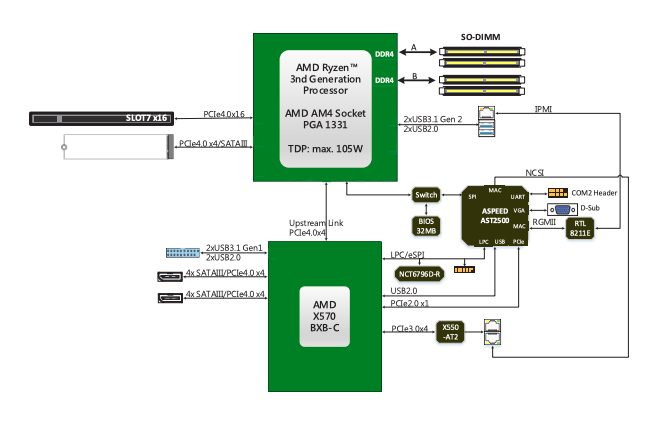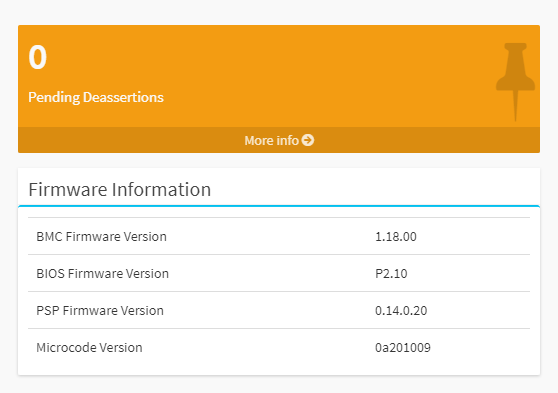
no RDMA but, can the other features be used to speed up SMB and NFS file transfers?

no RDMA but, can the other features be used to speed up SMB and NFS file transfers?
Intelligent Offloads refers to mostly a number of TCP offloads where the NIC itself handles certain aspects of the TCP sessions instead of the OS/CPU, possibly increasing performance and freeing up CPU cycles from handling this work. Whether that will speed up SMB or NFS probably depends on a lot of other factors which may be the actual bottleneck such as using older protocol versions of SMB/NFS, disk I/O bottlenecks, etc. It should be easy to change those settings with ethtool in Linux, but many of the optimizations should already be enabled by default with newer driver versions. The X550 has been in the market since 2016.
Did you have any issues installing ESXi? I have the same board, BIOS and BMC firmware versions but every time the ESXi installer crashes at the same point, when it loads the vmc_ahci driver. Different USB sticks, virtual CD drive, different M.2 storage/removing it all doesn’t seem to do anything. Driving me up the wall :T
So after additional troubleshooting, it likes like it has to do with stability issues with the Ryzen 3600 and the current non-beta BIOS. After updating it to the current beta BIOS of L2.08a, the stability issues appear to be gone. Going to hit it with some more strenuous testing and see what happens
Have no issues with ESXi on the 5800x with the latest L2.08a BIOS. I am however unable to passthrough the SATA controller to a VM and it seems that that is not an issue that’s tied with this board.
I’ve used the 2 x Kingston KSM29SED8/32ME on this board and works fine!
Anyone know if there are BIOS settings that would force the USB ports from the header and the USB ports on the rear I/O panel to be handled by separate USB controllers?
I took a look at the block diagram for the board (page 11 in the manual) and, though I have very little experience reading hardware architecture diagrams, it looks like the USB 3.1 Gen 2 ports are connected directly to the CPU while the USB 3.1 Gen 1 header is connected to the X570 chipset.

The output of lspci (below) seems to show that there are two USB controllers on the board:
root@mycomputer:~# lspci | grep USB
2a:00.1 USB controller: Advanced Micro Devices, Inc. [AMD] Matisse USB 3.0 Host Controller
2a:00.3 USB controller: Advanced Micro Devices, Inc. [AMD] Matisse USB 3.0 Host Controller
2f:00.3 USB controller: Advanced Micro Devices, Inc. [AMD] Matisse USB 3.0 Host Controller
Note that I believe 2a:00.1 and 2a:00.3 are the same controller since they have the same bus number and device number.
In the BIOS I see a few options related to XHCI (USB 3.0) controllers in the “X570/X590 Chipset USB Configuration Options” submenu and the “FCH Common Options” submenu. In the X570/X590 menu there are options to enable/disable Controller0 and Controller1 which further suggests to me that there are two controllers on the board:
Controller0My experiments have shown that disabling Controller0 via the “FCH Common Options” menu removes the controller at 2f:00.3 from the system. However, regardless of which port I plug my USB peripherals into, they are all handled by controller 2a:00.3. USB 2.0 peripherals and USB 3.0 peripherals are attached to separate buses but they are all serviced by that same aforementioned controller.
Bus 3 --> 0000:2a:00.3 (IOMMU group 20)
Bus 003 Device 011: ID 046b:ff10 American Megatrends, Inc. Virtual Keyboard and Mouse
Bus 003 Device 010: ID 046b:ffb0 American Megatrends, Inc. 4-Port USB 2.0 Hub
Bus 003 Device 009: ID 046b:ff20 American Megatrends, Inc.
Bus 003 Device 007: ID 046b:ff01 American Megatrends, Inc. Virtual Hub
Bus 003 Device 005: ID 413c:3010 Dell Computer Corp. Optical Wheel Mouse
Bus 003 Device 008: ID 0b05:190e ASUSTek Computer, Inc. Dell USB Keyboard Hub
Bus 003 Device 006: ID 20f4:808a TRENDnet
Bus 003 Device 003: ID 0bda:5411 Realtek Semiconductor Corp. 4-Port USB 2.0 Hub
Bus 003 Device 004: ID 413c:2010 Dell Computer Corp. Keyboard
Bus 003 Device 002: ID 413c:1003 Dell Computer Corp. Keyboard Hub
Bus 003 Device 001: ID 1d6b:0002 Linux Foundation 2.0 root hub
Bus 4 --> 0000:2a:00.3 (IOMMU group 20)
Bus 004 Device 005: ID 174c:55aa ASMedia Technology Inc. ASM1051E SATA 6Gb/s bridge, ASM1053E SATA 6Gb/s bridge, ASM1153 SATA 3Gb/s bridge
Bus 004 Device 004: ID 05e3:0749 Genesys Logic, Inc. 4-Port USB 3.0 Hub
Bus 004 Device 003: ID 0bda:0411 Realtek Semiconductor Corp. 4-Port USB 3.0 Hub
Bus 004 Device 002: ID 090c:1000 Silicon Motion, Inc. - Taiwan (formerly Feiya Technology Corp.) Flash Drive
Bus 004 Device 001: ID 1d6b:0003 Linux Foundation 3.0 root hub
I’m aiming to pass-through two of the ports on the board to a VM and am hunting for the magic BIOS settings that might split these ports onto distinct controllers. It would be acceptable for my rig if the passed-through ports had to run at USB 2.0 speeds and to that end I searched for “XHCI/EHCI handoff” options in the BIOS but could not find anything.
Any suggestions or help would be greatly appreciated!
Here are the OcuLink cables that I mentioned I bought from Taobao.
I’ve tested this one and can confirm it works.
https://item.taobao.com/item.htm?spm=a230r.1.14.49.761b6b14fg8hir&id=625473438025
I’ve not tested this one and this is the one that has a SGPIO header. Will see if I can get a picture.
https://item.taobao.com/item.htm?spm=a230r.1.14.138.761b6b14fg8hir&id=631155344467
I just received my motherboard and it seems perfect. Lucky enough my cooler and other components fit nicely and work as expected.
I’m using an Asetek 645LT on the CPU, but I can’t figure out how to control the pump PWM and/or the fan PWM. Are there any actually BIOS settings for controlling the fans (FAN1, FAN2, FAN3) individually? I’ve connected the pump to FAN1 and the radiator fan to FAN2.
I’ve upgraded my BIOS to P2.10 after receiving a link from ASRock to support my Ryzen 9 5900X.
Could you please share the P2.10 bios?
Sure, I also received BMC version 1.25.00, but it’s password protected and I never received the password. 
I’m attaching both below.
@kosmon did you have any issues with 2.08a? I updated to it when I got my board to be able to use a 5900x as well, and I didn’t have any issues.
I haven’t tried 2.08A, this was the BIOS and BMC ASRock sent me when I contacted them.
Could someone else with this variant of the motherboard, run this in a linux terminal and paste here the result?
for netdevs in $(lspci | grep I210 | awk '{print $1}'); do echo -e "$netdevs - Link Speed: $(cat /sys/bus/pci/devices/0000:$netdevs/max_link_speed) - Link Width: $(cat /sys/bus/pci/devices/0000:$netdevs/max_link_width)x"; done
copy and paste it as a single line. It might need root permissions.
I’ve noticed a lot of this motherboard devices negociated a 2.5GT/s link which translates into version 1 (ONE) of the PCI-e. That can mean that there’s not enough PCIe bandwidth for the network card to reach duplex 1Gbps speeds.
my results are on a X570D4U (the one without 10Gbe) are
26:00.0 - Link Speed: 2.5 GT/s - Link Width: 1x
27:00.0 - Link Speed: 2.5 GT/s - Link Width: 1x
The result of that (i think) is download speed on either embedded interfaces is capped at 300Mbps.
Thank you!
(I would ask on the X570D4U thread but this stupid crap of a forum won’t let me post more than 3 posts on the same thread)
EDIT: Nevermind. It seems it’s supposed to be 2.5GT/s 1x from the intel spec.
Does anyone know if it’s possible to use the OCuLink ports for something other than SATA? Like wireless cards? 4G? Thunderbolt?
the manual states: “2x OCULINK (support 4x SATA or PCIEx4 from OCU1, 4x SATA or PCIEx4 from OCU2)”
So it seems like there is PCIe there, but to use it you would probably need some weird risers:
Maybe this to get an m.2 slot: Delock Products 64041 Delock Converter SFF-8612 to 1 x M.2 Key M slot
And maybe this further into normal PCIe slot if needed: Delock Products 64041 Delock Converter SFF-8612 to 1 x M.2 Key M slot
Edit:
Or maybe this: Delock Products 62788 Delock Adapter SFF-8643 > PCIe x4 with fixing plate
with OCULINK<>SFF-8643 cable
Got access to the ASRock FTP site and saw updated BMC versions. Unfortunately the only one that works is a 1.18 version. I see that Fan Setting is now available that wasn’t available before.

Hello,
I had Proxmox up and running since yesterday evening, when the power supply decided to die. Changed it, but from then I can not connect to the VE host and to all my VM’s. I did multiple scans for my local network, but VE and the VMs are gone.
I can log in to the shell locally, but when I try to ping anything I receive Destination Host Unreachable. Attached the screenshots of /etc/network/interfaces and /etc/hosts , these settings were working perfectly till yesterday.
ip a
Checked the NICs with other OS, they are fine.
Does anyone have an idea how can I get these settings runing again? Want to avoid reinstalling the whole thing for sure.
Could something corrupted during the power outage? I got Proxmox on a Kingston Datacenter ssd, what is claimed to be PLP.
Thank you.
Leave it, reinstalled Proxmox.
Also, what’s the best way to mount the Noctua N9i? I tried with some M3x12 screws, but I’m having trouble getting good contact between the CPU and the heatsink.